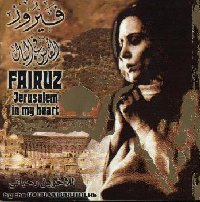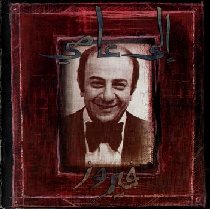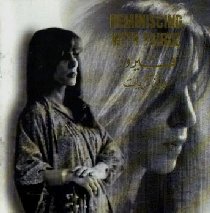
CD Booklets | Articles | Contents
Tributes | Files | Interactive | Lists | Special

CD Booklets | Articles | Contents
Tributes | Files | Interactive | Lists | Special
| Jersalem In My Heart "To the Arab World Fairuz came suddenly, as a miracle. At the time when Arabic singing was weighted down with conversation and perdictability, and spirits were nationally at their lowest, her voice rang, as though from the beyond, the notes of salvation and joy. Arabic music has never been the same since. Nostalgic but vibrant, sad but defiant, folkloric and yet so new, hers has been for nearly 30 years perhaps the only voice that seems so capable of jubliation in an almost cosmic sense. By turns mystic and amorous, elegiac and fiery, her singing has expressed and the whole emotional scale of Arab life with haunting intensity. Often singers give listeners pleasure as they expect. She often gives them, beyond their expectations, ecstasy." Jabra I. Jabra |

| |
|
To Assy "By words, You chose simplicity. By music, you chose simplicity. By simplicity you went into the homes of the people. You wrote history and left." Fairuz. "I am not speaking about this huge legacy, in fear that I start talking about myself. For writing now, is about him and Ziad's dedication is to his father. I stand to witness the two geniuses, that one which became a glowing past and this one that linked him with a lit future. Assy. Despite his thorough music education, his inspiration came from himself and his people. He wandered in obscurity and in his interests in the truth. Art for him came from consciousness and hard work and knowledge came from remembrance. He found rest from his usual worry in writing music/poems or in discussion groups, to forget, at least temporarily, that wary rising internal sound, where to? He was very close to his son Ziad who in this gesture to his father adds new things to what changed music in this Orient" Mansour Rahbani 1/21/1995 "Today as I am arranging the Rahbani music, I realize that 'Nihna Wel Kamar Jiran' song does not have tabla percussion, and despite that, it's popular. There were not similar songs in our culture before and so they fought it then as being westernized. It became from the most important songs in our Arabic culture. It can also be sung in any foreign language. It's international, simple, oriental and popular/folkloric. If someone wants to dance 'dabka' and claps his hands, there is a song that's called 'Shatti Ya Dinii' and with the same qualifications. Assy composed on the piano like the Bisq not the Oud. "Bisq is for the people, Oud is for the palace". These simple basic tones remain to hassle me, ring inside my head, and tell me: Play with me using other instruments, no matter how you feel, I'll remain myself. As if she is a woman that fits with all fashion fads. And so I wanted, after Assy was rewarded many times with speeches as if he was Caesar or Romel, to return some of the old Rahbina and their important songs to transfer them to a generation that doesn't know it. Since these songs were collected for remembrance, I did not accept anything for all my efforts z since 1988 so that it's really a reward." Ziad |

|
|
| Reminiscing with Fairuz For every heart there is a love And to every love there are memories And to the memories there is a world of beauty, yearning and a scent which days can not erase. And with every song, a love story survives through pain and tears. Tears for abandoning the lover and tears for uniting with the lover and some other fate tears for the times that past when the lover was a lover and life was the most beautiful. In our hearts, screams some of the gods of sound, love and enchanted string. Fairuz is in every heart of ours, with all of her love, memories and lonesome times. With Fairuz, Rahbani's poetry and music, green Lebanon, Aazzaroura, forests, the shepard, Al bint Al Chalabyia, Al Amar We AlJiran and El Maila Ala Ghouson. All of this is within reminiscing with Fairuz, the disc, presented to you by Voix de'l Orient.
|

|